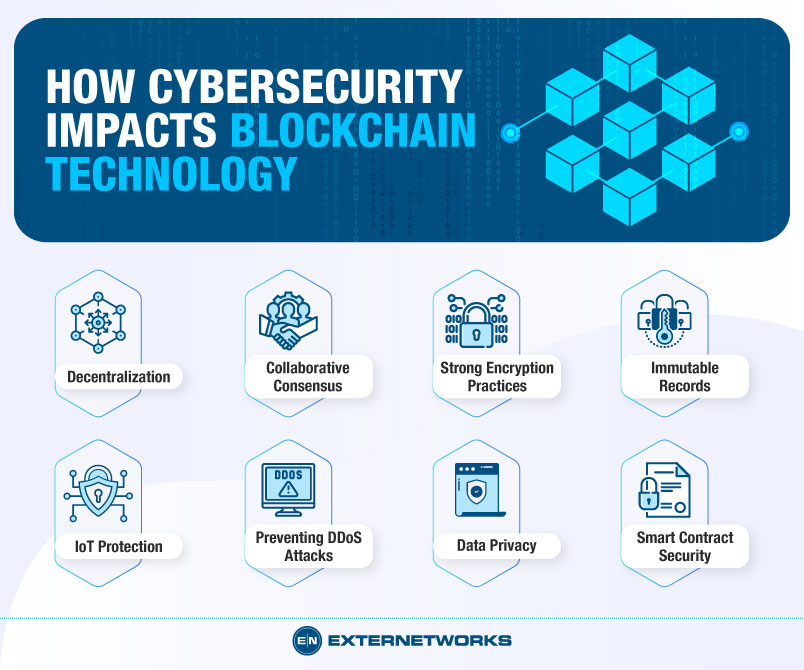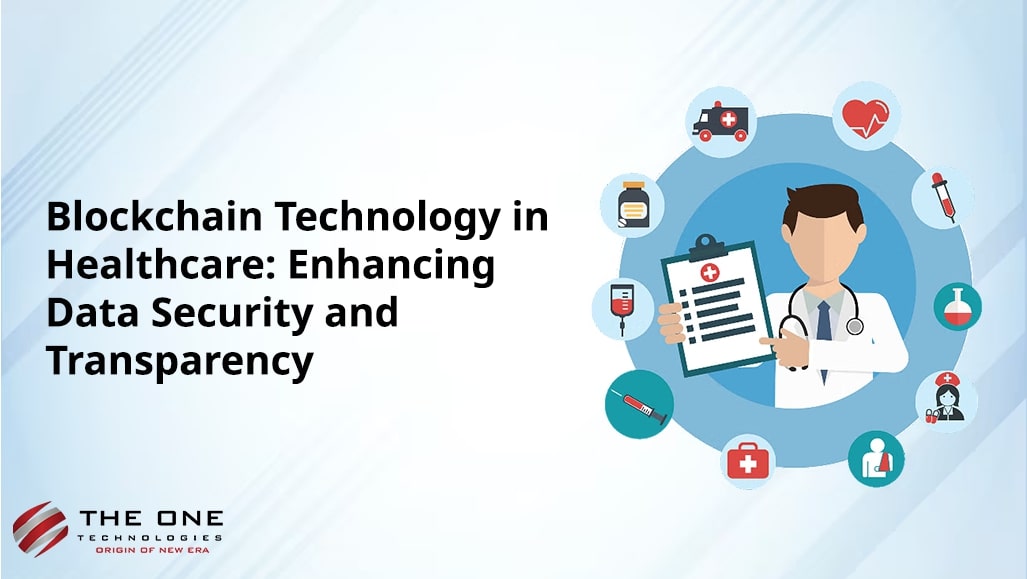Blockchain technology enables secure transfer of patient records, strengthens data defenses, manages medicine supply, and aids in genetic research. Despite promising potential, blockchain adoption in healthcare faces challenges like lack of technical knowledge and government involvement.
However, blockchain solutions offer patient-centered care and enhanced data security. The industry’s slow adoption is attributed to heavy regulation and complexity, hindering widespread implementation. As blockchain continues to evolve, its role in healthcare is poised to expand, transforming how patient information is managed and secured.
Stakeholders must overcome challenges to fully harness the benefits of blockchain technology in revolutionizing healthcare systems and enhancing patient outcomes.

Credit: www.reblonde.com
Current State Of Healthcare Data Security
Blockchain technology has made significant strides in revolutionizing the healthcare industry. With its ability to ensure secure transfer of patient records, strengthen data defenses, manage medicine supply chains, and aid in genetic research, blockchain adoption in healthcare is proving to be a game-changer.
However, challenges such as lack of technical knowledge, government involvement, and cybersecurity remain as barriers to widespread implementation.
Healthcare data security is a critical concern in today’s digital age, with the increasing frequency of cyber-attacks and data breaches. The safeguarding of patient information is paramount, and the adoption of blockchain technology in the healthcare industry offers promising solutions to enhance the security and privacy of sensitive data.Existing Vulnerabilities
The current healthcare industry faces numerous vulnerabilities in protecting sensitive patient data. Legacy systems and traditional databases are susceptible to cyber threats, leading to potential breaches and unauthorized access to confidential information. Inadequate encryption methods and centralized storage systems further exacerbate the vulnerabilities, putting patient privacy at risk.Exposure Of Patient Data
The exposure of patient data to security breaches poses significant risks to individuals and healthcare organizations. Unauthorized access to electronic health records (EHRs) and personal health information (PHI) can lead to identity theft, medical fraud, and compromised patient confidentiality. Lack of robust security measures leaves patient data susceptible to unauthorized alterations and tampering, undermining the integrity of healthcare records. Overall, the healthcare industry must address these vulnerabilities and enhance data security to protect patient confidentiality and maintain the integrity of medical records. Blockchain technology offers a promising solution to mitigate these challenges and establish a more secure and resilient healthcare data ecosystem.The Role Of Blockchain In Healthcare Data Security
Blockchain technology revolutionizes healthcare data security, enabling secure patient record transfers, stronger defenses, and advanced research capabilities. Adoption hurdles include technical knowledge gaps, paper reliance, and privacy concerns. Embracing blockchain promises enhanced patient care and streamlined operations in the healthcare ecosystem.
Adoption Challenges In Healthcare
Blockchain technology offers several advantages for healthcare, but its adoption faces significant challenges. These include technical knowledge gaps, lack of paperless methods, and insufficient government involvement. Overcoming these hurdles is crucial for the transformative potential of blockchain in the healthcare sector.
Lack Of Technical Knowledge
In the healthcare industry, one of the major challenges in adopting blockchain technology is the lack of technical knowledge among healthcare professionals. Blockchain is a complex technology that requires a deep understanding of cryptography and decentralized systems.
Healthcare professionals may not have the necessary skills and expertise to effectively implement and manage blockchain solutions. This lack of technical knowledge can hinder the adoption of blockchain technology in healthcare.
Without adequate technical knowledge, healthcare organizations may face difficulties in integrating blockchain into their existing systems and processes. They may struggle with configuring and maintaining blockchain networks, as well as ensuring the security and privacy of patient data.
To address this challenge, healthcare organizations should invest in training and education programs to enhance the technical capabilities of their staff. By providing comprehensive training on blockchain technology, healthcare professionals can acquire the knowledge and skills needed to effectively leverage blockchain solutions in their organizations.
Privacy Concerns
Another significant challenge in the adoption of blockchain technology in healthcare is privacy concerns. Blockchain operates on a transparent and immutable ledger, where every transaction is recorded and visible to all participants in the network. This raises concerns about the privacy and confidentiality of patient information.
Healthcare organizations need to ensure that sensitive patient data is protected and only accessible to authorized individuals. The decentralized nature of blockchain can make it difficult to control access and enforce privacy regulations. Additionally, the use of public blockchains may further exacerbate privacy concerns, as anyone can access the data stored on the blockchain.
To address privacy concerns, healthcare organizations can consider implementing private or permissioned blockchains. These blockchains restrict access to authorized participants, ensuring that only trusted parties can view and verify transactions. Additionally, organizations can employ encryption techniques to protect sensitive data stored on the blockchain, further enhancing privacy and security.
Transformation Of Healthcare Ecosystem
Transformation of Healthcare EcosystemIn the rapidly evolving landscape of healthcare, the adoption of blockchain technology is revolutionizing the industry. This transformative technology is reshaping how patient information is integrated, contracts are customized, and data security is ensured.
Integration of Patient InformationIntegration Of Patient Information
Blockchain technology allows for seamless integration of patient information across the healthcare ecosystem. Through secure and decentralized storage, patient records are easily accessible to authorized healthcare providers, enabling improved care coordination and patient outcomes.
Customized Contracts and Data SecurityCustomized Contracts And Data Security
With blockchain, healthcare organizations can create customized contracts tailored to individual patient needs. This personalized approach enhances patient engagement and satisfaction. Moreover, the immutable nature of blockchain ensures data security, safeguarding sensitive healthcare information from unauthorized access or tampering.
Disadvantages Of Blockchain In Healthcare
While blockchain technology has the potential to revolutionize the healthcare industry, it also comes with its own set of challenges. It is important to consider these disadvantages before fully adopting blockchain in healthcare.
Lack Of Standardization
One of the major disadvantages of blockchain in healthcare is the lack of standardization. Since blockchain is a decentralized system, there is no established standard for data formats, storage, or interoperability. This lack of standardization makes it difficult for different healthcare organizations to collaborate and share data seamlessly.
Accessibility And Ownership Issues
Another drawback of blockchain in healthcare is the accessibility and ownership issues. While blockchain ensures the security and immutability of data, it also poses challenges when it comes to accessing and managing that data. Since blockchain requires a consensus among multiple participants to validate transactions, it can be difficult to grant access to specific individuals or organizations. This lack of accessibility can hinder the efficient sharing of healthcare information and limit patient access to their own data.
Additionally, blockchain raises concerns about ownership of healthcare data. Since blockchain operates on a distributed network, it is challenging to determine who owns the data stored on the blockchain. This lack of clarity can lead to legal and ethical conflicts when it comes to data ownership and patient privacy.
In conclusion, while blockchain technology brings significant benefits to the healthcare industry, such as increased data security and transparency, it also comes with its own set of challenges. The lack of standardization and accessibility issues must be addressed to fully harness the potential of blockchain in healthcare.
Slow Adoption Of Blockchain In Healthcare
The healthcare industry has been slow in adopting blockchain technology, despite its potential to revolutionize data management, interoperability, and security. Several factors contribute to this sluggish adoption, including regulatory hurdles and the industry’s complexity.
Regulatory Hurdles
Regulatory hurdles pose a significant challenge to the adoption of blockchain in healthcare. The stringent regulations and compliance requirements set by healthcare authorities create barriers for implementing new technologies. Health organizations must navigate through a maze of legal constraints, privacy laws, and data protection regulations before integrating blockchain solutions into their existing systems, leading to a slower adoption process.
Industry Complexity
The complexity of the healthcare industry presents another barrier to blockchain adoption. Healthcare ecosystems involve multiple stakeholders, including healthcare providers, insurers, pharmaceutical companies, and patients, each with their own set of unique challenges and requirements. Integrating blockchain technology into such a diverse and intricate environment demands careful planning, coordination, and investment, causing the adoption to progress at a slower pace.
Future Outlook
The successful integration of blockchain technology in healthcare is now opening avenues for futuristic possibilities. The future outlook of blockchain in healthcare showcases promising advancements and innovative solutions that herald a new era of data management and patient care. The potential of blockchain technology in healthcare is poised to shape the industry, effectively addressing its challenges and transforming traditional processes.
Piloting Stage Of Blockchain In Healthcare
Currently, blockchain technology in healthcare is in the early piloting stages, with various organizations and companies exploring its implementation in different healthcare processes. The preliminary testing and trials have shown potential to revolutionize the way healthcare data is managed, enhancing the security, transparency, and accessibility of patient information across the healthcare ecosystem.
Benefits And Threats
Embracing blockchain technology in healthcare offers significant benefits, including enhanced data security, interoperability, and streamlined processes. However, the adoption also brings potential threats such as regulatory challenges, data privacy concerns, and interoperability issues that need to be addressed to ensure a seamless integration of blockchain in healthcare.

Credit: www.extnoc.com

Credit: www.linkedin.com
Frequently Asked Questions For “blockchain Technology Adoption In Healthcare”
How Is Blockchain Technology Being Used In Healthcare?
Blockchain technology in healthcare facilitates secure transfer of patient records, strengthens data defense, manages medicine supply, and aids in genetic research. Blockchain also helps achieve patient-centered care and enhances data security in the healthcare ecosystem. However, challenges like lack of technical knowledge and government involvement persist.
What Are The Important Challenges In Adopting Blockchain Technology In The Healthcare Domain?
Adopting blockchain in healthcare faces challenges like lack of technical knowledge and government involvement, paperless method adoption, cost reduction, privacy, and incentive. This slows down its transformation in the healthcare ecosystem. However, it promises improved data security and patient-centered care.
How Blockchain Will Transform The Healthcare Ecosystem?
Blockchain transforms healthcare by enabling secure transfer of patient records, enhancing data security, managing supply chain, and unlocking genetic codes to improve patient-centered care.
What Is The Disadvantage Of Blockchain In Healthcare?
The disadvantages of blockchain in healthcare include lack of standardization, accessibility, ownership, and change management. Blockchain technology is still at its piloting stage in healthcare, and there are challenges in its adoption due to the heavily regulated and complex nature of the industry.
Conclusion
Blockchain technology is revolutionizing healthcare by enhancing data security and streamlining processes. Its adoption can pave the way for improved patient care and data management. Despite challenges, the potential benefits of blockchain in healthcare are promising. Embracing this technology will undoubtedly shape the future of healthcare delivery.
